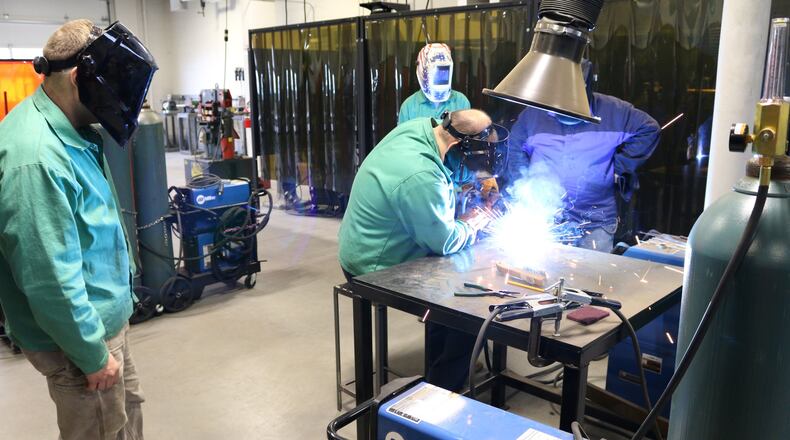Parrillo said in the last five years, Clark State has issued 42 associate degrees and 180 certificates across engineering, robotics, industrial technology, computer numerical control, computer aided design, welding, industrial maintenance, and collaborative engineering, as well as 14 bachelor’s degrees for the manufacturing technology management program, which can be started with any two-year engineering degree.
While the college has relatively traditional associate degree pathways, Parrillo said they have a “unique structure” to their engineering programs since students can mix and match short-term and one-year certificates to combine the necessary skills into their two-degree.
For example, a student can combine a welding certificate with a laser material processing certificate to complete their associate degree in manufacturing engineering technology, then those students can complete their bachelor’s in that same program.
Advanced manufacturing is a leading industry in the 14-county Dayton region, with more than 2,500 establishments and more than 130,000 workers. It contributes more than $11 billion in payroll to the regional economy, according to the Dayton Development Coalition, a JobsOhio partner.
Parrillo said the most in-demand programs depend on the position, employer and location, but “industries are moving toward more efficiency and automation.”
He said the laser materials processing program is “the now and future of subtractive and additive manufacturing” because, for example, laser welding requires less preparation and is more flexible than some traditional welding processes.
Automation, robotics and their programming, is important, he said, but the maintenance of robots and automated systems is in most demand.
The college was awarded a $180,871 Regionally Aligned Priorities in Delivering Skills (RAPIDS) grant from the Ohio Department of Higher Education to acquire manufacturing equipment and expand its career training programs in engineering, robotics and industrial technology.
The funding will be used to acquire several pieces of modern equipment for training in areas of advanced manufacturing, including robotics, computer numerical control, computer-aided design, welding, industrial maintenance and collaborative engineering.
“These additions will significantly enhance the student experience by providing hands-on learning with technologies that mirror those used in today’s most advanced production facilities,” Parrillo said. “This RAPIDS grant allows us to expand our capabilities and respond to the direct needs of local industry, ensuring our graduates are workforce-ready from Day 1.”
Equipment through the grant includes Fanuc Certification mobile carts and a metrology table workbench for precise measurements for the robotic technical certificate and workforce development programs; plus the Titan 25T CNC Press Brake for CNC programming, CAD, welding and industrial maintenance studies.
The college will also create Zoom room collaborative engineering and robotics classrooms that simulate modern collaborative work environments.
“This equipment gives our students access to the same technology used by regional manufacturers,” Parrillo said. “Whether they’re learning robotic programming or press brake operations, they’re developing the exact skills our employers need.”
Clark State has received other grants to support engineering and manufacturing programs, such as $540,000 in the spring to purchase hands-on training equipment and provide electrical, pneumatic training equipment and goggle systems for virtual clean room training experiences, as well as new gas lines for welding and laser processing. They also established a director of advanced manufacturing workforce programs position.
Students can enroll in any of the above programs, and there are scholarship funds through fall semester to pay full tuition for some students to complete certificates. Summer semester begins May 27 and fall begins Aug. 18.
For more information about programs and scholarships, visit clarkstate.edu.
About the Author

